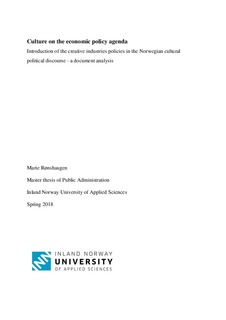| dc.description.abstract | This thesis investigates the development of economic and industrial policies aimed at the Norwegian cultural sector, through the introduction of the creative industries policies. Through its focus on innovation, economic growth and industrial policies, the protection of intellectual property and emphasis on the “creative workers”, creative industries policies have been argued to promote neoliberalism, and endorse neoliberal marketization of the cultural sector. This thesis aim is to discern how and why the creative industries policies are introduced in the Norwegian cultural political discourse, and how this introduction can be viewed upon in relation to the critique of the creative industries. The thesis also aims to explore how the introduction of the creative industries policies can be seen as a party political issue in the Norwegian cultural politics, based on the creative industries policies promotion of neoliberalism, the change from state interventions to the political issue of economic growth, and the connection to the British New Labour Government.
Based on a document analysis of six policy documents covering this initiative in the Norwegian cultural politics, the introduction and development of the economic and industrial aims is argued to be to a large degree formed by the creative industries-policies as described in the critical international discourse. However, in the Norwegian context, the choice of terms and rhetoric’s are chosen to be different.
The findings in the present thesis suggests that definitions and argumentations behind the operationalization of the Norwegian “cultural industries” can be seen as defending state subsidies for the arts and culture and problematizing commercialization. At the same time, the content of the policies is argued to promote a broader use of markets to control cultural production with the aim to utilize the cultural industries in the development of the Norwegian economy, through economic growth in the sector. An explicit goal of introducing the creative industries policies is the harnessing of creativity from the cultural sector for transfer to other sectors to strengthen the adaptability and competitiveness of the Norwegian economy. This can be argued to be seen as an exploitation of the “creative workforce”, which in the context of the Schumpeterian workfare state, is exploiting unsecure employments to the benefit of a stronger competitiveness and a dynamic national economy, and furthermore as an example of the Regulatory state, where the use of state interventions are decreasing, in favor of regulations of flexible markets. | nb_NO |
